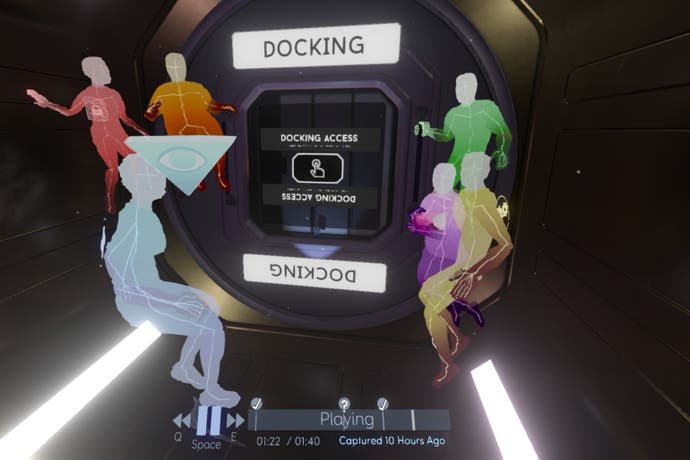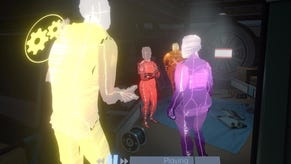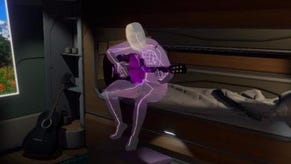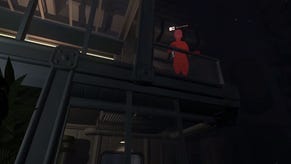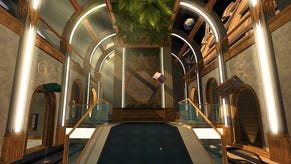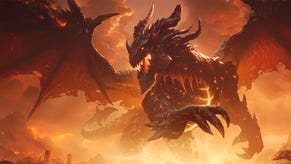I spent Christmas in space
The ghost of futures past.
WARNING: This piece contains spoilers for Tacoma.
I've never totally understood why Christmas is a time for ghost stories, but please don't mistake my confusion for disapproval. I'm very, very happy to spike the schmaltz with something creepy. Which is why, between calculating volumes of red cabbage to braise and sloshing sloe gin on the wrapping, this last December I found myself playing Tacoma, 2017's best ghost story.
Obviously, Tacoma's ghosts are not actual ghosts - this is sci-fi, not some haunted house hokum. Instead, they're augmented reality reconstructions of the commercial spacecraft's vanished crew that you (as salvage-specialist Amy Ferrier) access on your way through the station, the game unspooling its story as you walk among these shades. The incidents seem to have been preserved at random, though that fiction is belied by satisfying arcs and telling details thanks to developer Fullbright's writerly chops; you can rewind and replay each one, moving to different points in the environment to eavesdrop on different characters.
These AR figures occupy the exact volume and proportions of the absent personnel, but they're also round-edged and featureless. They show the space left by the missing, rather than calling the lost back into temporary existence. Meeting them for the first time, as I span about woozily in the station's gravity-free hub, I knew exactly what they reminded me of: the plaster casts of Pompeii's residents, caught forever in the moment the ash engulfed them. And like the Pompeiians, the puzzle of the Tacoma crew isn't what happened to them: as sure as we know Pompeii burned, we know from the start that that Tacoma has been evacuated.
Instead (and as in Fullbright's previous game, Gone Home), it's about turning archaeologist, piecing together who these people were from the strangely moving jumble of personal effects and private data left behind. Watching station administrator EV St James go to a drawer, lift something out and look at it thoughtfully, then rifling through the drawer for ourselves and finding what it was: a picture of her dead sister. Opening the crew's lockers to discover that serious, self-contained medic Serah has an extraordinary array of flexing fitspo pictures. Flicking through botanist Andrew's desktop to uncover his money troubles and his hopes for his son.
It's a process that's touching not just because of the contrast between these everyday human dramas and whatever the disaster was that forced them off the station; but also because, given what the game tells us about Venturis Technologies (the company that owns Tacoma), clinging on to any sort of individuality seems to be an act of resistance against the consuming power of capital. In this future, you don't earn wages, but loyalty points, which you're encouraged to invest back in the company. The crew are more indentured serfs than free economic agents selling their labour.
If you know your science fiction, you'll recognise the trope of the Big Bad All-Encompassing Enterprise. RoboCop's Omnicorp; Weyland-Yutani in the Alien films. Tacoma wears its genre on its sleeve, but such nods are more than Easter eggs to gratify the smug "I get this!" brigade (i.e. me). They're also feints and teases at what kind of story this will be. ODIN, the jittery AI that welcomes Amy onto Tacoma, summons up thoughts of 2001's man-v-machine battle. The heavy throb of grief, particularly in EV (she's left a copy of The Bell Jar in her quarters), hints at a Solaris type loss-in-space narrative.
In Solaris (take your pick from the 1961 Stanislaw Lem novel, the '72 Tarkovsky adaptation or the 2002 Soderbergh remake), we also follow the main character's exploration of the strange fate of a spacecraft's crew. Solaris (the planet the crew was investigating) has a nightmarish effect on the humans that encounter it: for each of them, it divines which person they're grieving for, then reconstructs the lost one from the bereaved's memories. The reconstructions are ghosts, but not ghosts: they aren't reincarnations of the original, because they know only what the person who created them remembers, but once they exist they seem to have free will.
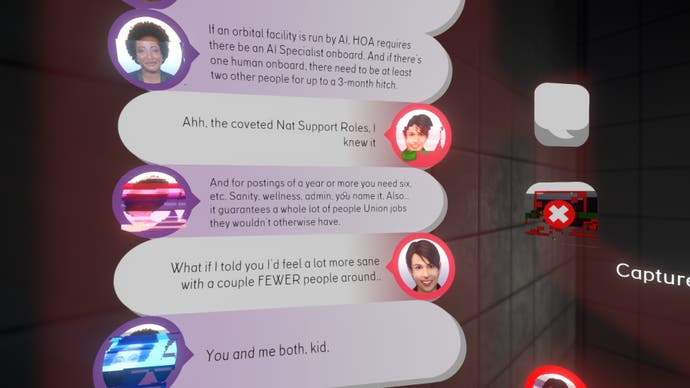
In the 2002 version, Dr Kelvin is tormented by the thought that he's remembered his dead wife Rheya wrong, even as he embraces the phantom of her. The same fear wracks the phantom. "I do remember things," she says, desperately, as they try to conjure up a shared past, "but I don't remember being there. I don't remember experiencing those things." She tries to kill herself repeatedly (and fruitlessly, since she's not really alive), fretting that the only reason she's suicidal is because Kelvin has remembered her this way. So Solaris is about memory, but specifically it's about how memory layers up into identity. If we don't have a history we can inhabit, like Tacoma replaying episodes from its crew's time on board, then we don't have a self.
Self is Tacoma's big theme. Self, and sentience. Can AI develop it? (ODIN seems to.) Can you have sentience if - like Venturis's malign central AI JUNO - you don't have sympathy for humans? That's why it's fitting that it's a narrative told through hauntings, through the looping presence of the past. What is a self but an accretion of stories, the kind that run in comfortable grooves to be told over and over again to an audience that basks in the familiarity - every one of us a Tacoma full of memories that explain who we are.
Which is what the ghost story is always about, at bottom. Yes, they're about the awful recursive nature of grief. Yes, they're about the terror of being caught circling between worlds. But also, they're about how a part of us - not a sufficient part to be human, but a necessary part - subsists in narrative and remembrance. And some evening at the fag-end of December, when your relatives are going tenth rounds with the leftovers and several hundredth rounds with the clapped-out family anecdotes, maybe this is when it makes sense that we tell ghost stories at Christmas: because repetition is what makes you, you.
